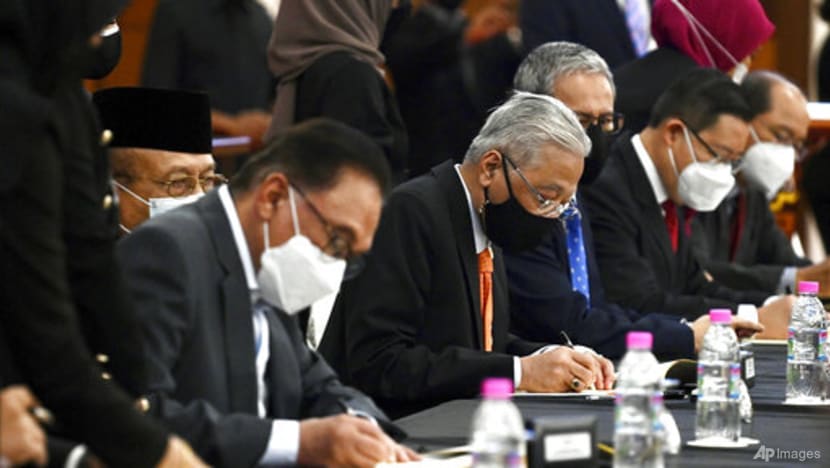Malaysia’s bipartisan cooperation MOU does not necessarily end on Jul 31, says Anwar Ibrahim
The leader of the opposition Pakatan Harapan coalition says that he does not want to force general elections because there are immediate concerns in the country that must be addressed.

Malaysian Prime Minister Ismail Sabri Yaakob, centre, and opposition leader Anwar Ibrahim, left, at the signing of the MOU on bilateral cooperation on Sep 13, 2021. (Photo: Zarith Zulkifli/Malaysia's Department of Information via AP)
SHAH ALAM, Selangor: Malaysian opposition leader Anwar Ibrahim said on Sunday (Jul 17) that the memorandum of understanding (MOU) outlining bipartisan cooperation between the government and the Pakatan Harapan (PH) coalition may not necessarily expire at the end of the month.
Mr Anwar added that he does not want to trigger a general election to be held because there are immediate concerns faced by the people that must be addressed.
Speaking to reporters during a press conference on the sidelines of the Parti Keadilan Rakyat congress, Mr Anwar said: "Regarding the interpretation of the MOU per se, it does not necessarily end in July. (It can end) in July, or during the (general) elections. We have to see then," said Mr Anwar.
"We don't want to be seen as not focusing on the issues faced by people," he added.
The MOU was inked in September 2021 to strengthen political stability amid the COVID-19 pandemic, following turmoil that saw a third prime minister installed since the 14th general election in 2018.
For the MOU signing, Malaysian prime minister Ismail Sabri Yaakob represented the government while Mr Anwar, Mr Lim Guan Eng, Mr Mohamad Sabu and Mr Wilfred Madius Tangau represented the four component parties of PH.
The PH alliance comprises Parti Keadilan Rakyat (PKR), Democratic Action Party (DAP), Parti Amanah Negara and United Progressive Kinabalu Organisation.
The deal is in effect from the date of signing until parliament is dissolved. The government also promised not to dissolve parliament before Jul 31.
As part of the deal, Mr Ismail Sabri offered a list of parliamentary and government administration reforms in exchange for support. He said the government would table an Anti-Party Hopping Bill, which if passed, would prevent politicians elected on one party’s platform from defecting to another party.
Other proposals included ensuring equal membership in parliamentary special committees for both government and opposition lawmakers, and granting the opposition leader the same remuneration and amenities as a minister.
On Sunday, Mr Anwar expressed concerns that ending the MOU in July could lead to parliament being dissolved, triggering general elections in the short term.
"We don't want to force a general election because there are some immediate concerns that must be addressed," said Mr Anwar, who is also PH chairman.
"My message to (Prime Minister) Ismail when I meet him next week is that (PH) does not want to be part of UMNO (United Malay National Organisation) strategy to hold either early or late elections. Our concern is to prepare ourselves, even if the elections (are) imminent," he added.
In April, Mr Ismail Sabri said he would abide by UMNO's decision that the government's MOU with PH on bilateral cooperation should not be extended beyond Jul 31.
Malaysia’s 15th General Election must be called by mid-September in 2023.
It is the prerogative of Prime Minister Ismail Sabri Yaakob to decide when the election is called, although the king must first give his consent to dissolve parliament.
Mr Ismail Sabri is facing pressure from members from his own party UMNO to call for polls. UMNO president Ahmad Zahid Hamidi has been very vocal and persistent in calling for the general election to be held immediately.
In May, Mr Ismail Sabri said during an interview with Nikkei that he would wait for "the right time" to call an election, given inflationary pressures partly stemming from the Ukraine conflict.
"We are now facing a period of increasing inflation with high prices ... Do you think this is the right time?" Mr Ismail Sabri reportedly said.

















